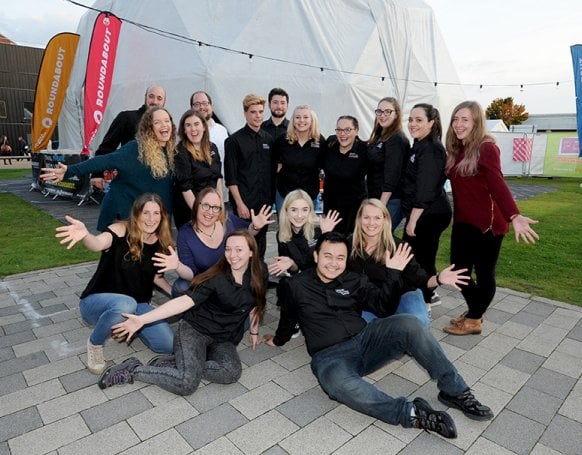
Venue staff at the PopOut Festival 2017
Photo: Stuart Wilde Photography
Developing home-grown talent
With over 80% of staff under 30, Lincoln Performing Arts Centre’s workforce is relatively young. Craig Morrow reveals how providing training and clear progression routes have been key to its success.
Lincoln Performing Arts Centre is a 444-seat venue, owned, operated and funded by University of Lincoln. Unsurprisingly, our higher education (HE) context has fostered a number of collaborative relationships with the university’s departments, particularly the School of Fine & Performing Arts which shares our city centre campus home.
This has led to a programme with a particular bias towards contemporary work and theatre for young people. Such a close connection to teaching has inevitably informed other aspects of our organisation and this commitment to young people’s development is reflected in our approach to training and employment.
Quite early on we realised that cultivating career progression routes was vital for staff retention and that signposting these pathways is crucial
Similar to most venues our size, our permanent team is lean, with only nine full-time equivalents, but we are also relatively young. If you exclude me, the average age of our managerial staff is under 25. And for many of my colleagues this is their first managerial position. Overall, over 80% of our staff are under 30. This is no doubt a consequence of Lincoln historically suffering from an exodus of skilled young people seeking arts jobs elsewhere, with few incomers arriving to plug the skills gap.
This has combined with a small employment churn and little opportunity for new individuals to gain the experience required to step up to department leads. Consequently, we have had to look at growing our own workforce, taking advantage of the increasingly youthful nature of the city (about 37% of Lincoln’s population is aged between 15 and 34, compared with 26% across England) by providing a series of interventions that can expand the pool of skilled individuals for the future benefit of the venue and the local cultural ecology.
Continuous professional development
Our approach to employing young people rests on a commitment to continuous professional development (CPD). We take considerable care to provide staff with comprehensive access to internal and external training, acknowledging that many staff members will be learning their profession on the job.
Permanent team members are also eligible for the University of Lincoln’s sponsored staff degree programme. The flexibility of our working practices is such that we look for opportunities for them to apply this course-based learning to real-world projects. This focus on a culture of learning is echoed at all levels, with casual venue staff given opportunities to train and work across departments such as marketing and box office.
Given that 90% of our part-time venue staff are under 25, this is a sound investment in the future and has seen colleagues progress internally, for example, from casual bar staff through to associate producer status.
Career progression
Quite early on we realised that cultivating career progression routes was vital for staff retention and that signposting these pathways is crucial. Our focus on employment opportunities therefore starts with secondary school and further education institutions through industry talks and work experience packages.
As young people move into university, these opportunities become more structured, forming part of industrial placement modules, where students can commit to a fixed number of hours within a particular department, delivering specified projects. Participants in these placements have subsequently gone on to be employed as casual venue staff where they then plug into our internal CPD schemes.
The importance of paid vocational training is vital outside an academic context if we are to provide career progression routes for young people from less affluent backgrounds. Accordingly, alongside paid, year-long graduate internships in marketing, we have offered NVQ apprenticeships in technical theatre, providing accredited real-world experience for those seeking alternative pathways into the industry.
Volunteer opportunities
Such formalised structures sit alongside volunteer opportunities, particularly Lincoln Young Producers, a young decision-making group that grew out of our participation in Lincolnshire One Venues Young People’s Programme. For the past six years this has supported a county-wide programme of opportunities for 12 to 25-year-olds.
This forum led by young people commissions, programmes and promotes events. The young people shadow staff members and gain some real-world experience vital for getting that elusive foot in the door. This group has been so successful at informing our thinking (and producing future employees) that we have taken it in-house, employing a founding member of the group as our Young Audience Producer to take over the facilitation and focus on engagement with young people across the organisation.
Supportive infrastructure
Although the situations we face operating in a small regional city are by no means unique, I believe our position within a higher education context has given us an opportunity to safely test different ways of addressing these issues. Working with young people and early-career professionals requires time, patience and a supportive infrastructure with mechanisms for identifying, mapping and responding to developmental demands – and it takes a while to get that right.
Indeed, these processes have not been without their challenges. Perhaps the biggest issue we have faced recently is a disinvestment in NVQ Level 4 apprenticeships. This is the last financial year we will support an accredited apprenticeship, due to regional further education providers no longer supporting the delivery of the programme.
In response to this, our technical manager has been working with University of Lincoln to establish a BA in Stage Management and Technical Theatre. We are also looking at the potential of postgraduate research degrees to help test and inform our working practices to ensure the venue’s resilience. It is in this area of degree programme expansion where we see the most potential for further supporting young people’s development.
Craig Morrow is Artistic Director of Lincoln Performing Arts Centre.
lpac.co.uk
Join the Discussion
You must be logged in to post a comment.